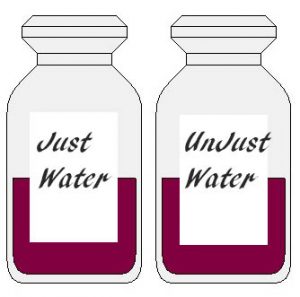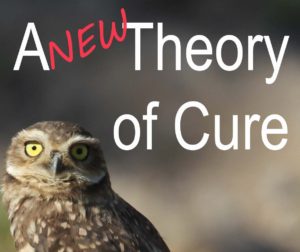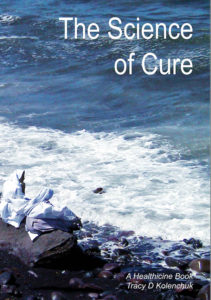 Let’s face it, the basic theory of homeopathy is bunk. ‘Like cures like‘. Not only is it simplistic nonsense, demonstrably false. It’s not even true to the meaning of ‘cure’. Homeopathy claims that substances which cause similar symptoms, cure the symptoms. But we don’t ‘cure’ symptoms.
Let’s face it, the basic theory of homeopathy is bunk. ‘Like cures like‘. Not only is it simplistic nonsense, demonstrably false. It’s not even true to the meaning of ‘cure’. Homeopathy claims that substances which cause similar symptoms, cure the symptoms. But we don’t ‘cure’ symptoms.
We cure illnesses. Symptoms rise and fall, wax and wane, as long as the illness is active – and fade away when it is cured. When we attempt to cure ‘symptoms’, the inevitable result is that the illness will appear to go into remission, and later reappear.
Homeopathic theory has no theory of cure, no clear medical or scientific definition of cure or cured, rendering the homeopathic mantra is ‘like cures like’ to a meaningless (but nice sounding) phrase.
So. If the basic theory of homeopathic makes no sense, how does homeopathy persist? How does it continue to exist, even to thrive in the face of modern medicine? Brace yourself for the reality.
Modern Medicine Has No Theory of Cure
Modern medicine cannot dispute homeopathy’s theory of cure, because it has no theory of cure itself. Modern medical reference texts do not define cure, and do not use the word cure consistently. Many current medical dictionaries simply do not have definitions for cure, cured, nor for incurable. Modern medicine’s view of homeopathy is limited to arguments about treatments that do not cure. And the only winners are nonsense and marketers.
Sometimes, modern medicine actually cures. Cures are recognized for illnesses caused by a parasite (bacteria, fungus, etc., when the parasite is addressed, or killed. But there is no general theory of cure in modern medicine.
Note: The healthicine theory of cure is simple and direct – and it includes cures that are brought about by killing parasites:
An illness is cured when the cause is successfully addressed.
Homeopathy persists because it works.
A simple google search to find lots of people eager to prove that homeopathic medicines CANNOT WORK, because they contain no active ingredient. Many of them even quote so called ‘scientific’ clinical studies demonstrating again and again that homeopathic medicines work ‘no better than a placebo‘, that homeopathic medicines cannot work and do not work. But this nonsense – and it is nonsense – has little effect on homeopathy. Why? Because homeopathy works. There are many homeopathic doctors, and many homeopathic patients who know that it works, that it worked for them in specific situations.
What’s the catch? The catch if the definition of ‘works’. There are several definitions of ‘works’ to consider.
Works: Cure
First of all, do homeopathic medicines ‘cure’ any illness?
When we look at ALL of the clinical studies that look at the effectiveness of specific homeopathic medicines, compared to non-homeopathic medicines, we might notice something a bit strange.
Most clinical studies of homeopathy do not count cures. There is one study, done about 50 years ago, that counted cures. But when the study was ‘replicated’ 30 years later, the test for ‘cured’ was removed – and cures were not counted. Do you recognize the smell a dead rat?
Current studies of homeopathy are designed without a definition of cure. They are designed such that, if a cure occurs, it cannot be tested, cannot be proven. Cures are ignored. The so called ‘scientific’ studies of homeopathic medicines, those that compare homeopathic medicines to a placebo, and those that compare homeopathic medicines to a non-homeopathic medicine, don’t look for, have no way to notice, and don’t count cures.
It’s not just homeopathic studies. ‘Works’ as defined by today’s practice of medicine, seldom considers ‘cure’. Most clinical studies do not define, and do not test for ‘cured’.
Clinical studies comparing homeopathic medicines to non-homeopathic medicines, are simply studies of which medicine ‘does not cure‘ better.
‘Works’ is defined by the effect a medicine has on the symptoms. The effect it has on the illness is ignored.
Maybe you think that’s strange?
Actually, it’s usually the case for modern medicines as well. Most clinical studies, whether they study homeopathic medicines or not, are studies of which medicine ‘does not cure‘ better. If you look at a few hundred, or a few thousand current clinical studies, you will find very few that define or test for ‘cured’. Most medicines, homeopathic or not, simply make no attempt to cure. The fact that homeopathic medicines do not try to cure is moot, irrelevant.
What illnesses are Treated with Homeopathy?
There are three types of illness that might be treated by homeopathy.
- Minor first aid problems, like cuts and bruises
- Acute illnesses – like cold and flu, that usually go away quickly,
- Long term chronic illnesses.
You might notice something interesting about these types of illnesses. NONE of them can be cured by conventional medicine. Today’s modern practice and science of medicine has no definition of cured for first aid problems (they are healed, not cured); nor for illnesses like the common cold (the are called ‘self limiting’ and no medicine can help and no medicine is necessary except for symptoms); nor for chronic illnesses. In today’s medical theory and practice, all chronic illnesses are incurable.
This gives considerable insight into the success of homeopathy. If modern medicine cannot cure an illness – who is to say that homeopathy can’t cure it either? Maybe homeopathy can cure some of those illnesses?
There’s the rub. If ‘cured’ is not defined in conventional medical theory, and cured is not defined in homeopathy, all bets are off. Any homeopath can claim a cure, and it can’t be proven, but it can’t be disproven either. As long as conventional medicine makes no attempt to define cure – when homeopathy claims to cure, homeopathy is one up.
Works: Chronic Illness
Most homeopathic treatments are for chronic illness. When people break their arm, or cut their leg, or get a strange rash, or suffer severe chest pains, they don’t search out a homeopath – they head to the hospital emergency department. When they have cold or flu symptoms that persist, and might be dangerous, they head to a doctor, not a homeopath.
Many people first visit a homeopath when they have a chronic illness that’s getting worse, that conventional medicine has consistently failed to address and cure. Homeopaths are often a last resort after conventional medicine fails. Every success by a homeopath should be seen as ten times more valuable than a success by conventional medicine, because it can teach conventional medicine new techniques. But are homeopathic successes celebrated and studied? No, they are dismissed and ignored, especially if they cure.
A chronic illness is often defined as one that persists longer than 3 months, in most cases, and is defined implicitly or explicitly as incurable. There are no defined cures for diabetes, heart disease, hypertension, arthritis, obesity, cancer, or any other chronic disease. If you have one of these diseases, and it ‘goes away’, it is not possible to prove it was cured. Cured is not defined for these diseases.
Healthicine Note: The healthicine definition of cure recognizes that chronic illnesses have chronic causes. Chronic illnesses are cured by addressing the chronic nature of the cause. Modern medical theory ignores chronic causes and thus fails at chronic cures.
It is trivial to create a specific chronic illness, and trivial to cure it as well. All that is necessary to create a chronic illness is to create the causal situation, lower the dose and extend the duration. The illness is cured by removing the cause.
Sometimes, treatments recommended by current medical reference texts lead directly to chronic illness, that can only be cured by addressing the chronic cause – the chronic medicine. Treating an illness with chronic medicines that do not cure, can easily create a chronic illness. If a person has scurvy, all three medical treatment reference texts (Merck, Lange’s, and Harrison’s) acknowledge the cause is a dietary deficiency of Vitamin C. They recommend treatment (not cure) with supplemental Vitamin C. However, supplemental Vitamin C does not actually ‘cure’ scurvy, because it does not address the dietary cause. As soon as the patient stops the medication, the symptoms re-appear. The illness was never cured, the cause was never addressed.
All three medical references recommend a treatment for scurvy that creates a chronic illness – incurable in theory. Even though the cure for scurvy is clearly understood, it is not stated in the recommendations. Some credit to Merck – they do recommend a dietary change, but it is recommended as a treatment, not as a cure. Not one of the texts uses the word cure. In medical theory – according to these references, scurvy is incurable.
Conventional medicine gives up on cures for chronic illness. Homeopathy does not give up. It tries to cure chronic illness. Sometimes, it succeeds. How often? We don’t know, because ‘cured’ is not defined, cannot be tested.
Works: Has a Positive Effect on Symptoms
Most clinical studies of medicines measure whether or not it has a positive effect on symptoms. If patent owners believe the medicine is marketable, they also need to design clinical studies to prove that the medicine is safe to use, and figure out the dosage that is dangerous. Most homeopathic medicines, have no dangerous dosage.
Placebo treatments have strong effects on symptoms. All medicines have placebo effects. Therefore, any medicine, whether it is a homeopathic medicine, or a conventional medicine, will have a strong positive effect on symptoms.
All medicines, even placebos, ‘work’ when ‘cure’ is not studied, not defined and not tested. ‘Works’ becomes a nonsense argument about ‘which medicine does not cure better’.
Works: Clinical Studies
There is another important aspect of clinical studies that must be understood, if we want to understand the success of homeopathy.
Clinical studies are specifically designed to PROVE a hypothesis. If a clinical study does not PROVE the hypothesis being studied, it is a failure, and probably will not be published.
A clinical study can be designed to prove the effectiveness of a specific treatment, or, it might be designed to disprove the effectiveness of a specific treatment. Clinical studies are, by design, self-fulfilling prophecies. If a clinical study does not meet their potential as a self-fulfilling prophecy, the study and the study designer has failed.
If we want to prove the effectiveness of a specific treatment, we need to design a clinical study that will, if all goes well – or fate is on our side – “prove the effectiveness of the treatment”. If we fail in our design, our clinical study is a failure.
On the other hand, if we want to disprove the effectiveness of a specific treatment, we need to design a clinical study that will, if all goes well – or fate is on our side – “disprove the effectiveness of the treatment”. If we fail in our design, our clinical study is a failure.
So… When you see a clinical study proving that a specific medicine, or medical treatment ‘worked’, you can bet your bottom dollar that the study was specifically designed to prove that the treatment ‘works’. When you see a clinical study proving that a specific medicine, or medical treatment ‘did not work’, you can bet that same dollar that the study was designed to prove that the treatment did not work. If the study did not accomplish what was set out at the beginning, it failed. Failed studies are seldom published.
Most clinical studies of homeopathic medicines are designed to prove that the medicine did not work, or works ‘not better than a placebo’. So, successful clinical studies of homeopathic medicines that are successful demonstrate that the medicine did not work – even if some patients were cured.
Homeopathy vs Homeopathic Medicines
It is important, when discussing homeopathy, to clearly distinguish between homeopathy and homeopathic medicines. There are, as far as I know, NO studies that measure homeopathy for effectiveness.
Frankly, I don’t believe a medical scientist would dare to undertake such a study. Based on the fact that modern medicine does not define ‘cure’ or ‘cured’ and makes no attempt to cure any chronic illness – it is impossible to make an honest assessment of homeopathy. What if it cures a patient? A conventional medical scientist cannot make an assessment, if cured is not defined.
Medical science deliberately limits ‘clinical studies’ to specific medicines. Arguing trivialities, while ignoring the bigger question. Clinical studies are designed to work like a surgical knife. They draw a clear line, a clear cut between A and B. Between one medicine and another, or between one medicine and a placebo. Clinical studies measure specific treatments, for specific groups of people, with specific diseases or medical conditions.
Clinical studies don’t actually work it you try to compare a medical practice like homeopathy, or naturopathy, or chiropractic, or osteopathy, Traditional Chinese Medicine, or Ayurveda, or conventional medicine, to any other. Current medical theory has no clinical studies that attempt such a comparison.
So… Medical researchers resort to testing specific homeopathic medicines, in specific situations, comparing those medicines to specific conventional medicines (or placebos). Only treatments that DO NOT CURE are tested, because only treatments that do not cure can be ‘measured’ objectively, when cured is not defined.
The results are interesting in theory, useless in practice.
If we want to know how homeopathy ‘works’, to learn when it works best, and when it doesn’t work so well, we need to study homeopathy, not ‘selected homeopathic medicines that do not cure‘ on illnesses that are defined as ‘incurable’ by medical science.
When we begin to search for the truth, the whole truth, and nothing but the truth, by openly and honestly assessing homeopathy, not specific medicines, we will learn more about medicine, the science of medicine, and the practice of medicine, than we learn about homeopathy.
Arguing that a homeopathic medicines ‘cannot work’ is a distraction, a red herring, deliberate ignorance of the truth. In truth, homeopathy works some of the time. In truth, modern medicine works some of the time. But works is not good enough. We will do better when we pursue cures, not symptoms.
to your health, tracy
Founder: Healthicine


